Archive for the ‘Guardian’ Category
Moral outrage on tap
 W A R N I N G :
W A R N I N G :
Repeated dosage of Moral Outrage
may turn you conservative.
July 31, 2014 – Individuals have been doing “sickening”, “disgusting” things since… well, at least since the beginning of recorded history. And if we accept that it’s important to ruminate on the terrible acts of strangers, then there’s an endless supply to choose from. We can be 24-Hour Outraged People. It’s our moral obligation.
You may laugh at that reductio, but have you looked at “quality” newspaper comment pages or popular web forums recently? Moral outrage has become such a ready, familiar mode of cognition – and expression – that it functions like a sort of currency, particularly in online social “transactions”.
Unfortunately, moral outrage – like fear – tends to activate authoritarian conceptual frames while it inhibits empathy. Empathy precludes the perception of a human being as a “monster”, “animal”, “sub-human scum”, etc. That much seems obvious. But perhaps it’s less obvious that headlines which repeatedly refer to human beings only by the crimes of which they’re convicted (or merely accused) – eg “The Predator”, “The Welfare Cheat”, “The Racist” – will tend to inhibit, in a broader way, the experience of “empathy” on which progressive morality (and, generally, “liberal” politics) is based. Empathy is towards other people (including, but not limited to, victims). Moral outrage is exclusively concentrated on what seems “lower” than human.
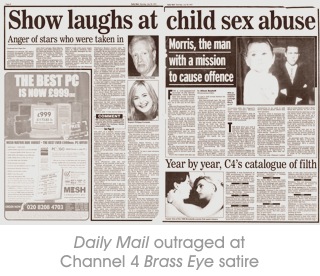 There was a time – not long ago – when newspapers such as the News of the World got a lot of mileage from “paedo” hysteria. Chris Morris’s Channel 4 comedy, Brass Eye (full video here), satirised this “coverage” hilariously, capturing all its absurdity and hypocrisy. And then, of course, the Daily Mail (and others – including government ministers) turned their outrage on Morris and Channel 4. How dare they joke about such a serious subject?
There was a time – not long ago – when newspapers such as the News of the World got a lot of mileage from “paedo” hysteria. Chris Morris’s Channel 4 comedy, Brass Eye (full video here), satirised this “coverage” hilariously, capturing all its absurdity and hypocrisy. And then, of course, the Daily Mail (and others – including government ministers) turned their outrage on Morris and Channel 4. How dare they joke about such a serious subject?
Channel 4, and other commentators in the more “liberal” areas of the press, rightly shrugged, sighed, and effectively said: “You idiots, can’t you see that it’s satire, and that it’s satirising media coverage, and in particular the type of reaction we’re getting from you right now”.
July 19, 2001
Chris Morris, the satirist who tricked politicians into railing against a fake drug “cake”, has caused controversy again by duping celebrities into endorsing two fabricated anti-paedophilia campaigns for his latest TV series.
A furious Phil Collins last night said he was taking legal advice after having been filmed with a T-shirt bearing the words “Nonce Sense” while giving “advice” to children. […]
The programme, clearly designed to satirise the hysteria surrounding the issue last year, was due to be shown earlier in the month.
I wonder if the Guardian and Channel 4 would take the same progressive view towards such satire in today’s climate (post- Jimmy Savile type scandals, etc). Given some of the Guardian’s recent attacks on the satiric humour of The Onion, the creator of Family Guy, Reginald D. Hunter’s ironic use of the “N” word, etc, I’m not too confident they would.
Certain types of moral outrage – like fearmongering – should probably be viewed as a media virus, or a special type of contrived “news” frame. Repeated often, and widely (a bit of moral outrage with breakfast every morning), they strengthen the neural connections on which this mode of cognition are based. Of course, in the “liberal” press it’s (mostly) directed at different things than in the rightwing tabloids. But the logic of the currently fashionable “zero tolerance” type framing applies to both, together with a tendency to demonise individuals (as opposed to simply condemning the crime/”crime”).
Why do these tendencies reinforce conservative moral systems? Because they’re based on conservative (authoritarian, so-called “strict father”) premises such as tolerance-as-weakness, character weakness as direct cause of immorality, etc. These moral premises may be unspoken (and unconscious), but they directly oppose the progressive morality of tolerance-as-virtue, compassion/empathy as ‘integral’ with systemic causation, etc.
I’ve previously written about the Luis Suarez saga(s), and how media outrage appeared (to put it mildly) disproportionate to the actions of one individual. The Guardian was probably the worst in terms of sheer volume of moral outrage (exceeding the tabloids in this regard). The emotion released apparently so warped the perceptions of some journalists, that they routinely got the facts wrong (one senior sports reporter for The Independent admitted to me, by email, that he had indeed made some erroneous, and fairly serious, accusations – these were never corrected in the newspaper).
Another recent (slightly less emotive) case concerned a magazine “report” that Steve Coogan had been dismissively critical of Angelina Jolie’s humanitarian campaigning. This “story” was soon republished by others (eg The Independent) and, by the churnalism process, became this claim: “STEVE Coogan claims Angelina Jolie’s efforts to help refugees and rid wars of rape is ‘off-putting’.” An army of tweeters then expressed their moral outrage at Coogan. Felicity Morse, the Independent’s social media editor (whose tweets I mostly enjoy), tweeted the following to her 15,000 followers:

The implication was that Coogan “hates” those who “try to end rape in war”. A serious, reputation-damaging suggestion. As it turned out, the report was completely wrong – Coogan’s remarks weren’t directed at Jolie at all. To me, the problem was not so much that the report was later confirmed to be wrong, but that you could see beforehand that the claims didn’t logically follow from the quotes attributed to Coogan. (I had gently warned Felicity about this immediately after her tweet – to no avail. Moral outrage has its own logic, its own course to run).
The Independent later amended its article, but only enough to save face. The headline (which now reads: Steve Coogan appears to brand Angelina Jolie’s humanitarian efforts ‘off-putting’…) is still misleading, since the whole premise on which the story was based has evaporated.
There are many more cases. In fact, they now seem a daily occurrence. What used to be a regular staple of the worse tabloid rags now appears to be a large part of what fills space in supposedly progressive newspapers such as the Guardian and Independent (particularly on their websites, where space is unlimited). In the latter cases, the issues referenced (eg anti-racism, anti-sexism) may be progressive, unlike in the tabloids. But the underlying moral framing of outrage looks the same – the Trojan horse of ‘zero tolerance’ and the conservative logic of essences and moral ‘character’.
Note: I hope I don’t alienate any of my readers with the above. I often feel morally outraged at events, both distant and close to me – it’s not something I demean. My purpose has been to focus on one particular ‘framing’ aspect of moral outrage – something that, to my knowledge, nobody else has focused on.
Lakoff in Guardian
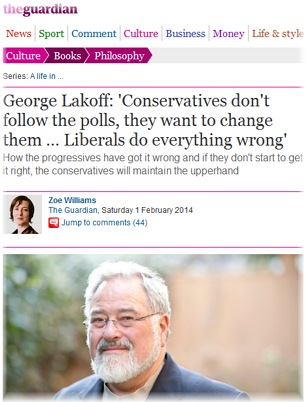 Feb 5, 2014 – Just a brief post to: a) point to a smart Guardian piece on George Lakoff’s ideas, and b) express my frustration (ranty prose ahead) at the level of ignorance/idiocy on the topic of framing that I see in feedback on newspaper comments sections, Twitter etc.
Feb 5, 2014 – Just a brief post to: a) point to a smart Guardian piece on George Lakoff’s ideas, and b) express my frustration (ranty prose ahead) at the level of ignorance/idiocy on the topic of framing that I see in feedback on newspaper comments sections, Twitter etc.
I’ve found Twitter useful for searches. For example, a search on “lakoff” brought up tweets linking to Zoe Williams’s new Guardian article (well worth taking the time to read). Unfortunately, the same search brings up an assortment of not-so-knowledgeable reactions to the article, and to Lakoff’s ideas in general.
It’s the same with the “post a response” sections underneath online newspaper articles. Tom Hodgkinson (editor of The Idler) recently put it this way:
“At the foot of the article sat a collection of ‘comments’ by the usual collection of morons. Anyone who believes in the democratization of journalism should check out the dimwits who gather ‘below the line’. The Telegraph ones seemed even more big-headed and stupid than the Guardian ones, if that’s possible.” *
Zoe Williams’s article states that Lakoff prescribes “the abandonment of argument by evidence in favour of argument by moral cause”, which is understandable within the context of Lakoff’s cognitive-linguistics work on how we think (eg in political frames). But to someone who isn’t familiar with Lakoff’s academic books, and the emphasis he places on empirical research, the notion of abandoning “argument by evidence” (and the notion that “facts” “weaken” political beliefs) probably confirms their ignorance-derived suspicions that framing subverts “reason” in a bad way. Indeed, the first response to Williams’s article was this:
Interestingly, the Guardian article attracted less than 50 comments – low compared to the number Zoe William’s articles usually get. That’s probably because it was hidden away in the ‘Philosophy’ section of the Guardian site, rather than in the more-publicised ‘Comment is Free’ area – a strange decision by whoever was responsible (it’s happened before with Lakoff-themed pieces) given that the article seems more topical and comment-worthy than much of the frivolous space-filler published in CiF. Williams’s article was also posted (pirated? stolen?) at the “independent” media sites, AlterNet and The Raw Story, where, in both cases, it attracted several hundred comments (many of them as stupid and/or ignorant as the ones you get at online corporate media). I hope those sites pay Zoe something for her work, or at least asked her permission to publish.
Moving back to Twitter. One of my “lakoff” searches brought up the following:
It turns out that both of these Tweeters write for the Guardian and New Left Project (and one of them follows me on Twitter). So I can’t quickly dismiss such remarks as ignorant Twitterish. But I find it a tad frustrating: you don’t have to read the complete Lakoff oeuvre to see that he doesn’t “ignore” those things mentioned in the tweet. Probably just one of his books is sufficient to show that. To dig deeper, there’s a rich treatment of the “libertarian-authoritarian axis” in his work on moral politics. The academic work on conceptual metaphor, prototype and narrative will likely give you more new insights into the “difference between sales pitch and product” than you’ll find in 99.9% of political commentary (including the “radical left” variety).
As for “ignoring” “big money”, the irony is that Lakoff’s political books (Whose Freedom, Don’t Think of an Elephant, etc) seem motivated by his concern precisely at the way “big money” – via the giant, massively-funded rightwing messaging machine, acting through the mass media – has managed to shape our thinking for decades, at the level of what we think of as “common sense”. This is a constantly recurring theme in Lakoff’s books, together with his treatment of “free market” ideology and what he calls the ‘Economic Liberty Myth’.
Note: If you were perplexed by the notion of making evidence and facts less prominent in political argument, I’d recommend the following passages from Lakoff’s Thinking Points, to give a flavour of what he is saying:
We think and reason using frames and metaphors. The consequence is that arguing simply in terms of facts—how many people have no health insurance, how many degrees Earth has warmed in the last decade, how long it’s been since the last raise in the minimum wage—will likely fall on deaf ears. That’s not to say the facts aren’t important. They are extremely important. But they make sense only given a context. […]
We were not brought up to think in terms of frames and metaphors and moral worldviews. We were brought up to believe that there is only one common sense and that it is the same for everyone. Not true. Our common sense is determined by the frames we unconsciously acquire […] The discovery of frames requires a reevaluation of rationalism, a 350-year-old theory of mind that arose during the Enlightenment. We say this with great admiration for the rationalist tradition. It is rationalism, after all, that provided the foundation for our democratic system. […] But rationalism also comes with several false theories of mind.
We know that we think using mechanisms like frames and metaphors. Yet rationalism claims that all thought is literal, that it can directly fit the world; this rules out any effects of framing, metaphors, and worldviews. We know that people with different worldviews think differently and may reach completely different conclusions given the same facts. But rationalism claims that we all have the same universal reason. Some aspects of reason are universal, but many others are not—they differ from person to person based on their worldview and deep frames.
We know that people reason using the logic of frames and metaphors, which falls outside of classical logic. But rationalism assumes that thought is logical and fits classical logic.
If you believed in rationalism, you would believe that the facts will set you free, that you just need to give people hard information, independent of any framing, and they will reason their way to the right conclusion. We know this is false, that if the facts don’t fit the frames people have, they will keep the frames (which are, after all, physically in their brains) and ignore, forget, or explain away the facts.
If you were a rationalist policy maker, you would believe that frames, metaphors, and moral worldviews played no role in characterizing problems or solutions to problems. You would believe that all problems and solutions were objective and in no way worldview dependent. You would believe that solutions were rational, and that the tools to be used in arriving at them included classical logic, probability theory, game theory, cost-benefit analysis, and other aspects of the theory of rational action.
Rationalism pervades the progressive world. It is one of the reasons progressives have lately been losing to conservatives. Rationalist-based political campaigns miss the symbolic, metaphorical, moral, emotional, and frame-based aspects of political campaigns.
* From Hodgkinson’s Register, mailed on 29/10/13.
Letters to the editor
 Oct 16, 2013 – Over a decade ago, I’d sometimes send letters to newspapers – to see if they’d publish my weird, naive opinions. Surprisingly, they often did. Occasionally, one of my letters would be printed by two newspapers on the same day – as when the Times and Independent published something I wrote about Tony Blair in 2005 (see below).
Oct 16, 2013 – Over a decade ago, I’d sometimes send letters to newspapers – to see if they’d publish my weird, naive opinions. Surprisingly, they often did. Occasionally, one of my letters would be printed by two newspapers on the same day – as when the Times and Independent published something I wrote about Tony Blair in 2005 (see below).
Even The Sun published a few of my letters – probably out of shock that a Sun reader could actually manage to string a few sentences together. (Of course, I’m not a Sun reader – I just sent letters out to all the newspapers. The first I heard of The Sun publishing my letter was when I received a £15 “prize” from them for it. Jackpot!).
(I pretty much stopped writing to the media when everybody started doing it – as a result of campaigning websites which encouraged a sort of template approach. It got too crowded and rote).
Here are a few examples of my letters which were published…
Dear Editor,
This country is much wealthier than in the 1970s, when most students paid nothing for their education. The “funding crisis” in higher education is created not by lack of funds, but by a dubious political ideology.
(The Sun, 28/1/2003)
Dear Editor,
The way this government talks about work reminds me of the infamous “Arbeit Macht Frei” (“Work Makes One free”) Nazi concentration camp entrance sign. Hitler provided full employment. Prison workshops have full employment. Coercion can always create full employment. What happened to leisure? We’ve seen incredible advances in labour-saving technology over the last 30 years, yet working hours have risen during this period. And now government ministers want to promote a “work first” culture. Are they insane?
(Read out on BBC Radio 4 ‘PM’ news, 5/7/2001)
Dear Editor
Re: Flu Epidemic – Last year’s Government clamp-down on “sick-note culture” was regrettable. Taking time off sick is increasingly seen as a bad career move, with the result that everyone in the office catches flu. My advice: prevention is better than cure, so call in sick before you get ill. (The Guardian, 12/1/2000)
Dear Editor,
Gordon Brown says full employment is achievable. Problem is, half of UK jobs produce no “real wealth”, no resources or services useful to human life. These pointless jobs (many in financial services) have no effect except to move money around in databases, benefiting the rich. It used to be called usury. People actually burn up fossil fuels travelling to these pointless jobs. (The Independent, 16/3/2001)
Dear Editor,
On average, fewer than 10 children are killed each year by strangers in England and Wales, according to government figures. Road accidents, however, kill or seriously injure several thousand children every year. The media obsession with paedophiles distorts perceptions of risks to children. (The Sun, 26/7/2000)
Dear Editor,
The way politicians talk, you’d think welfare fraud and juvenile delinquency were the two greatest threats to civilisation. Being young and unemployed*, I feel more threatened by politicians.
(News Of the World, 10/12/2000 –- *the bit about being “young and unemployed” wasn’t 100% true)
Dear Editor,
The government has overlooked an obvious way to tackle road congestion: give employers financial incentives to allow staff to work from home. If only 10% of office staff worked one day a week at home, we’d notice a significant reduction in road traffic (and pollution).
(Printed in the Independent & Daily Express, 18/12/2002)
Dear Editor,
Tony Blair dismissed the Lancet report on Iraqi deaths. He also dismissed the LSE report on ID-card costs. He now dismisses the Chatham House report linking the London bombings to the Iraq war. Is it rational behaviour to simply dismiss everything that contradicts one’s worldview?
(Printed in the Times & Independent, 20/7/2005)
A Tale of Two Racisms
24 July 2012 – I intended to write about something called ‘moral licensing’, but the Daily Mail published something (on football racism) that deserves comment. This will probably interest those who’ve followed the John Terry & Luis Suarez cases, but I doubt it’ll interest anyone else, unfortunately. (The ‘moral licensing’ piece – which, in an odd way, is relevant to this – will follow in a few days).
I won’t rehash the Terry & Suarez cases (I’ll assume you know the details). There were some striking similarities between the cases, and some differences – eg process and burden of proof (more on that below). Also, the media coverage. Here’s what caught my eye in the Daily Mail yesterday (23/7/12):

(There’s an online version of this on the Daily Mail site – scroll down past the main story).
It was written by Mail columnist Martin Samuel. The parts which caught my attention were these (my bold):
- “To brand a man a racist requires only a balance of probability, according to the FA.”
- “…his outdated ideas about a case needing to be proven.”
- “Terry did not swing in a proper court, so now he will be tried in one with less exacting standards.”
So, to summarise: The FA’s “standards” in these matters aren’t as “exacting” as they could be. And, anyway, the newfangled “balance of probability” doesn’t establish proof, and it’s insufficient to “brand a man a racist”.
The UK media (en masse, including the Daily Mail) – took the exact reverse of this position over the FA’s “standards” on the Suarez case. “Balance of probability” was regarded as appropriate – yes, a lower burden of proof than “beyond reasonable doubt”, but just fine for the job. And quite sufficient to “brand a man a racist” (actually, “racial abuser”). As for “exacting standards”, the UK press fell over themselves to congratulate the FA on its 115-page Suarez report. Here’s what one fairly typical Guardian piece said about it:
The thoroughness, attention to detail and remarkable depth of the 115-page document […] a report that has prompted legal experts to talk about a document that is “appeal proof”. […] has brought a new meaning to the word transparency by revealing every last detail […] this extraordinary report… (Guardian, 1/1/2012)
This kind of gushing praise for the FA report was all over the newspapers, as was quick denunciation of those who criticised or questioned the FA panel’s verdict. Even before the FA released its delayed 115-page report, criticism of its verdict on Suarez – whether direct or implied – was framed by the UK media as “shameful“, as “confusing” the “zero tolerance message” on racism. When Suarez’s club (Liverpool) raised the issue of lack of evidence, etc, they were denounced as “beyond the pale“, “hypocritical“, and their actions viewed as a “constant undermining of the FA’s role“:
“Some of the words being used to describe the FA and its role in governance on these sort of issues, that is really beyond the pale.” (Piara Powar, BBC, 8/1/12)
(One of the things I learned about the fight against racism – from campaigners such as Piara Powar, Lord Ouseley, Sports editors at the Guardian, etc – was that it entails, indeed requires, an uncritical acceptance of “the FA and its role in goverance on these sort of issues”. I’d never realised this before, as the FA always seemed to me like a dubious assortment of inept old blokes in suits, with a rich history of unprogressive views and general cluelessness. But that’s what the UK media is for – to inform and educate).
Bandwagons, herd-mentality, etc
So, what about Martin Samuel of the Daily Mail – author of the above critical remarks about the FA’s “standards”, etc (in the context of the John Terry case). Surely he, of all people, didn’t jump on the hack-bandwagon – praising the FA’s Suarez report and dismissing its critics? Actually, that’s exactly what he did. Here’s the damning evidence, from his Daily Mail column, 4/1/2012:
 Burden of proof
Burden of proof
The FA uses the civil “balance of probability” rule of proof. This generally means a lower burden of evidence required to “prove the matter” than applies in criminal cases.
Many journalists seem to forget that “balance of probability” is a flexible rule, and that the more serious the allegation, the greater the burden of evidence required to prove the matter. This is clearly stated in the FA panel’s 115-page report on the Suarez case (see paragraphs 76-80). Paragraph 80 states: “The FA accepts that the Charge against Mr Suarez is serious, as do we. It is for this reason that we have reminded ourselves that a greater burden of evidence is required to prove the Charge against Mr Suarez.”
Martin Samuel’s piece, above (on the Terry case), perhaps confuses the issue over “proof” and “standards” (depending on how you interpret his wording). “Balance of probability” doesn’t, in itself, imply “less exacting standards”. It implies a lower burden of evidence, which is not the same thing – it doesn’t mean a licence to be sloppy. In fact, on the Suarez case, the media seemed convinced that the “balance of probability” rule had been applied to the most exacting standards. (Close scrutiny of the FA panel’s report reveals that this wasn’t the case. The FA’s own prescription for stronger evidence – in accord with the seriousness of the allegations – seems to have been “forgotten” by the FA’s panel, and completely overlooked by the media. No direct evidence/witness testimony was submitted in the Suarez case. And so the ironies pile up…).
Please also see: the original piece I wrote exposing media falsehoods on the Suarez case: Media on Racism: Part 1 – Churnalism (this article “went viral” on social media, and has been read by several hundred thousand people to date).
Anxiety-inducing frames
This is an updated (& much rewritten) version of an article published by the Guardian in 1999,
which I originally wrote for the Idler magazine.
 In every job interview I’ve had, I’ve struggled to give the (false) impression that I was applying out of free choice & enthusiasm (rather than financial dilemma & survival anxiety). Telling the truth rarely helps in these matters, and most interviewers wouldn’t want to hear it.
In every job interview I’ve had, I’ve struggled to give the (false) impression that I was applying out of free choice & enthusiasm (rather than financial dilemma & survival anxiety). Telling the truth rarely helps in these matters, and most interviewers wouldn’t want to hear it.
Financial anxiety turns most of us into useful idiots. In the everyday world of tedious wage slavery, useful idiots can be identified by their claim to like their jobs (I don’t mean the lucky few who really love their jobs). When so many people seem to “enjoy” being economic slaves, or at least pretend to, one suspects something beyond deluded sentimentality – something sinister and pathological.
We’re living in an anxiety culture and we’re driven by fear. For 1 in 7 people, it’s of clinical severity (15% of people in England suffer from an anxiety-related mental disorder). A Mental Health Foundation report (2009) found that 77% of people say they are more frightened than they used to be, and 66% have fear/anxiety about the “current financial situation”.1
The MHF report criticises politicians, public bodies, businesses and the media for what it calls “institutionally-driven fear”, fuelled by scaremongering use of “most calamitous scenarios” on issues such as crime, terrorism, the economy, etc. (Incidentally, I was amused to see that the MHF report cited my 1999 Guardian article* as a source for: “60% of employees suffer from feelings of insecurity and anxiety, with 43 % having difficulty sleeping because of work worries” – a finding I’d quoted from a 1995 ITV documentary, World in Action).
Yuppies-in-adverts redux
The picture that emerges seems at odds with the grinning, self-assured yuppie reality beamed into our living rooms during commercial breaks. It’s a cliché, but advertisers still present a world where “normal” people smile perpetually while driving their expensive new cars. The result is that we feel abnormal and humiliated driving old cars or taking buses. No one is immune from these social-comparison anxieties, not even the marketers themselves (surveys show advertising executives to be “plagued by self-doubt and insecurity”2).
There are strong vested interests in keeping public anxiety at a high level. Anxious people make good consumers – they tend to eat/drink compulsively, need more distractions (newspapers, TV, etc) and more buttressing of their fragile self-image through “lifestyle” products. The financial services industry (insurance, savings, etc) makes billions from our financial insecurities. The unsubtle targeting of our fears is evident in adverts for everything from vehicle recovery services and private health care to chewing gum and mouthwash.
Employers benefit if workers fear losing their jobs – fearful people are less likely to complain, and tend to be more suggestible and compliant. Politicians cite “public fears” as justification for freedom-eroding legislation; insecure populations show a tendency to favour the authoritarian rhetoric of “strong leaders”. In a word, governments and corporations gladly reap the harvests of high public anxiety.
The Daily Scare
According to the Mental Health Foundation report, 60% of those who think that “people are becoming more anxious or frightened” blame it partly on “the impact of the media”. Anxiety can be induced in a population by constantly focusing on the threat of things like crime and terrorism in an exaggerated way. (I wrote the article before the financial collapse; it’s possible that with an emphasis on economic perils, crime isn’t currently hyped so much).
 In a MORI poll conducted in the early 1990s, half of those questioned believed that tabloid newspapers have a vested interest in making people more afraid of crime. In 1995, the makers of Frontline, a Channel 4 documentary on crime, requested interviews with the editors of the Daily Mail, Mirror, Sun, Daily and Sunday Express, Today, People and Star, to ask how they justified their sensationalised crime coverage. They all refused to be interviewed.3
In a MORI poll conducted in the early 1990s, half of those questioned believed that tabloid newspapers have a vested interest in making people more afraid of crime. In 1995, the makers of Frontline, a Channel 4 documentary on crime, requested interviews with the editors of the Daily Mail, Mirror, Sun, Daily and Sunday Express, Today, People and Star, to ask how they justified their sensationalised crime coverage. They all refused to be interviewed.3
Unfortunately, many people believe the crime hype (belief seems to correlate with acceptance of the conservative “moral breakdown” framing). A third of elderly women fear going outside their homes, but only one in 4,000 will be assaulted.4 Statistically, the elderly and young children are the groups least at risk from attack – but because newspapers repeatedly cover crimes victimising the vulnerable, they seem more common than they are.
One effect of our over-stimulated fears is widespread paranoia. Consider this news item from the Independent newspaper: “Teachers have been warned not to put sun cream on young pupils because they could be accused of child abuse”. These warnings were then criticised by cancer charities. Skin-cancer risk versus child-abuse accusation risk. Welcome to Anxiety Society.
Most fear/worry results from what we’ve been thinking rather than external events. We’re immersed in anxiety-inducing belief systems which we regard as perfectly normal. Exposure to these fearful worldviews starts in early childhood, before we’ve developed intellectual defences, and it continues in school, where we learn to be obedient, economically-frightened grown-ups.
Anxiety-inducers
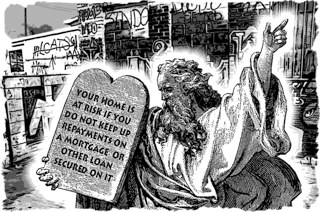 “Fear triggers the strict father model; it tends
“Fear triggers the strict father model; it tends
to make the model active in one’s brain”5
— George Lakoff
One of the most insidious anxiety-inducers is a sort of secular equivalent of “original sin” – the belief that, in essence, you’re “lacking” or “not good enough” and must redeem yourself with hard work and suffering. This “no pain, no gain” worldview manifests as the idea that you’re infinitely undeserving – that reward, ie happiness, will always be contingent upon the endurance of unpleasant activity (eg work).
It makes life seem a burden rather than an adventure, it’s exploited to the maximum by big business, and it makes you feel guilty.
This deep-seated mindset can be subverted with psychological gimmicks. For example, try believing that you deserve to be paid for doing nothing. Dismiss the notion that you have to “earn” anything. You earned your life by being born – now you deserve to relax. Quit your job and go on holiday, or call in sick as often as possible. Remove all forms of guilt from your mind. Go to extremes of laziness and indulge yourself deluxe-style every day. (When re-reading this paragraph, it seemed almost “blasphemous” in the current austere climate. I originally intended it as partly serious, partly ironic).
‘False responsibility’ framing
Another insidious anxiety-inducer to watch out for is the belief that you should be responsible. This puts people under tremendous strain. You don’t choose your genetic makeup or the conditions in which you grow up, yet all the unfortunate things that happen are supposed to be your fault.
In most cases, the de facto function of “individual responsibility” is social conformity. Society holds you accountable if you don’t comply with its definition of your responsibilities. The attraction of “responsibility” is that it allows people total conformity without removing the facade of heroic individuality – it’s the kind of concept that advertisers dream about.
This “responsibility” tends to see everything as a problem needing a solution – usually involving endless work. Pushed too far, it undermines progress towards desirable conditions such as increased leisure. Intelligent attempts to drastically cut average working hours, for example, are resisted on the basis that it’s irresponsible. (Similar, perhaps, to the Puritanism that H.L. Mencken described as “The haunting fear that someone, somewhere, may be happy”).
 Sometimes it might make more sense to pay people to stay at home – as Buckminster Fuller noted when attempting to quantify the amount of fossil fuel we burn whilst travelling to pointless jobs. But politicians – the experts on responsibility – see joblessness as the ultimate irresponsible lifestyle. It never occurs to them that their idea of responsibility might not be universal.
Sometimes it might make more sense to pay people to stay at home – as Buckminster Fuller noted when attempting to quantify the amount of fossil fuel we burn whilst travelling to pointless jobs. But politicians – the experts on responsibility – see joblessness as the ultimate irresponsible lifestyle. It never occurs to them that their idea of responsibility might not be universal.
Thus, a real and massive problem – how to distribute wealth humanely in a wealthy technological (ie automated) society – becomes as unsolvable as the mythical “moral breakdown” when it’s framed in terms of jobs & joblessness (with all the social anxieties that this framing triggers).
“Fear triggers the strict father model”. In Lakoff’s terminology, the “strict father model” refers to the deep cognitive frames which form the moral worldview of rightwing “conservatives”. In effect he is saying that people tend to think in more conservative (and less progressive) terms to the extent that they are being frightened.
Footnotes
*My original Guardian article was published on 8 October, 1999, in the Guardian’s ‘Editor’ pull-out supplement. The text is available online here.
1. The Mental Health Foundation’s April 2009 report, titled In the Face of Fear, which “reveals a UK society that is increasingly fearful and anxious”.
2. Quoted from The Times, 22 November 1996.
3. Frontline, Channel 4, 4 October 1995.
4. Sunday Times, 6 August 1995.
5. Lakoff, Don’t think of an elephant, page 42.
Media on Racism: Part 2 – Framing
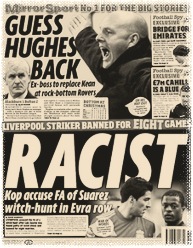 Jan 23, 2012 – Top Gear’s “lazy
Jan 23, 2012 – Top Gear’s “lazy Africans Mexicans” routine was broadcast to millions. It made minor news, with no repercussions. Luis Suarez’s dialogue with Patrice Evra was heard by nobody and unrecorded, but it led to a media frenzy of blaming ‘n’ shaming – with many journalists mistaking their own carelessness for a moral high horse.
The different outcomes can be explained partly by the N-word and partly by a confused application of “zero tolerance” framing, both of which featured in the Suarez coverage, but not in the Top Gear case.
Racism framing & the N-word
No word is racist in itself – it depends on context/frame. Conceptual “frames” for racism include:
- Racial stereotyping/abuse
- Ironic slang
- Comedic mockery of stereotyping/abuse
- “Quoted” use in reportage, novel, film, etc
BBC and Ofcom initially dismissed the Top Gear incident as category #3 – but a later BBC investigation effectively placed it in category #1 (assuming that “Mexicans” connotes ethnicity – see part 1). That’s supposed to be serious – but you wouldn’t have thought so from the media coverage, or the lack of penalties for Top Gear’s producers.
The Suarez case was different, as it involved the N-word. In English (current usage), both “nigger” and “negro” imply a racist frame. “Negro” in Spanish is a different story, particularly in Latin American usage. The linguistic experts brought in by the Football Association (FA) stated that:
“The term can also be used as a friendly form of address to someone seen as somewhat brown-skinned or even just black-haired. It may be used affectionately between man and wife, or girlfriend/boyfriend, it may be used as a nickname in everyday speech, it may be used to identify in neutral and descriptive fashion someone of dark skin” (para 172 – my emphasis)
And the FA’s experts went further, pointing out that Suarez was innocent of racial abusiveness if his account of his use of “negro” was accurate:
“…the use of ‘negro’ as described here by Mr Suarez would not be offensive. Indeed, it is possible that the term was intended as an attempt at conciliation and/or to establish rapport”. (Para 190)
Of course, this assumes that Suarez’s account (eg that he said “negro” only once) was true. Evra claimed he used the word multiple times, and in a way that the FA’s language experts agreed would be considered offensive. The initial reaction to Suarez’s defence, from some commentators, was that whatever meanings the word had in Suarez’s country, there was “no excuse” for it “in the United Kingdom“…
“Ignorance no excuse”
The Spanish word sounds different – and has different meanings – than the English version. Is it widely known that friendly use of the Spanish word may be mistaken for its racially-offensive use? Is it widely acknowledged that the friendly usage should therefore be avoided? The “ignorance is no excuse” objection doesn’t quite capture the logic – since the speaker might be aware that “negro” is usually offensive in English-language use. A conversation in Spanish is different. A whole cultural/linguistic can of worms is opened up (see “Whose Ignorance?” section below).
The FA’s panel effectively had two choices for “finding” Suarez guilty – they could accept Suarez’s claim of inoffensiveness, but punish him anyway (based on the “ignorance is no excuse” reasoning), or they could accept Evra’s version – ie direct racial insult. By choosing the latter, they effectively freed themselves from entanglement in cultural/linguistic issues – but they also gave themselves a seemingly impossible burden of proof, given the lack of evidence corroborating Evra’s account.
I say seemingly impossible – we shouldn’t forget the media’s role in making extraordinary things possible. (Let’s see… A war with Iraq based on zero evidence of WMDs, a single uncorroborated source and a dodgy dossier?)
Media distortion
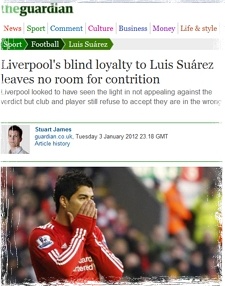 So, how did the “quality” press report the crucial matter of Suarez’s use of the Spanish “negro”? First, here’s Stuart James in the Guardian (on the FA panel’s 115-page report):
So, how did the “quality” press report the crucial matter of Suarez’s use of the Spanish “negro”? First, here’s Stuart James in the Guardian (on the FA panel’s 115-page report):
And then we come to Suárez, whose own statement screamed his innocence and flew in the face of everything the linguistic experts told the FA panel when they analysed what the player said to Evra at Anfield, the context in which it was said and how his comments would be interpreted in his homeland and beyond. The experts’ conclusion, lest it be forgotten, was that Suárez’s remarks would be “considered racially offensive in Uruguay and other regions in of Latin America”. (Guardian, 3/1/12)
This is wholly misleading. Stuart James presumably didn’t read the section of the report which describes how the FA’s linguistic experts agreed with Suarez about non-racial use of the Spanish word “negro” (eg paras 190, 194). The line from the report that’s quoted by Stuart James (taken from the summary, para 453) refers not to “Suarez’s remarks”, but only to Evra’s uncorroborated account of them. The report is quite clear about this. The FA’s experts concluded that:
‘If Mr Suarez used the word “negro” as described by Mr Suarez, this would not be interpreted as either offensive or offensive in racial terms in Uruguay and Spanish-speaking America more generally’
(para 194 – my emphasis)
The question that Stuart James and his media colleagues should perhaps be asking is: why was this important part of the report not cited in a single newspaper report or commentary?
Meanwhile, here’s James Lawton commenting in the Independent:
You cannot do what Suarez did – as proved by video evidence and confirmed by linguistic expertise, including a knowledge of the nuances of references to race in the player’s native Uruguay – and get away with some implausible argument that you were innocent of the charges against you. Not when you have been found, irrefutably, to have said, without the interruption of any other word, “black, black, black…” (Independent, 2/1/12)
This is disturbingly inaccurate and misleading. Three falsehoods in one paragraph (the “confirmed by linguistic expertise”, “proved by video evidence” and “found, irrefutably […] black, black, black” claims). Lawton not only makes the same mistake as Stuart James regarding the “linguistic expertise”, he also seems unaware that the crucial Evra/Suarez dialogue is not on any video recording. His use of the phrase “found, irrefutably” seems bizarre in the extreme, referring as it does to one man’s unsupported, uncorroborated claim (para 378).
Sadly, this was typical of most UK media coverage. The important point about the FA’s language experts agreeing with Suarez over N-word usage (thereby reinforcing the stance taken by Liverpool FC) was lost beneath the misleading statements and moralising.
Framing wars & PR
In the days following the FA’s Dec 20th verdict (minus reasons, which came later), various news frames jostled for dominance. John Barnes was widely quoted, labelling the case a “witch hunt“. Ian Wright (in the Sun) criticised the FA: “I think the punishment – on all public evidence – is ridiculously harsh…”. (Some reports had already alluded to a previous FA hearing which decided that Patrice Evra’s evidence was “exaggerated and unreliable”). And, of course, there was Liverpool FC’s statement (critical of the FA verdict), which most media described as “strongly worded“, “forceful“, etc.
The coverage was mixed. But this appeared to end after the Guardian pushed hard with a framing of Liverpool’s “shameful” handling of the issue – triggered (it appears) by a seemingly trivial piece of non-news (T-shirts – more on this below). As an outsider, with no affiliations to Liverpool, fan-wise or otherwise, I observed the “respectable” media’s outpouring of vitriol (over nothing very much) with puzzlement. It was almost as if there were some kind of PR/lobbying going on behind the scenes.
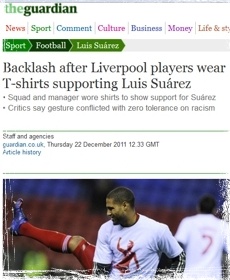 “Backlash” against T-shirts!
“Backlash” against T-shirts!
(& other faux “news”…)
In a match warm-up on 21 December, Liverpool players briefly wore T-shirts printed with a picture of Suarez. This reinforced the message of Liverpool’s earlier statement – and said nothing that wasn’t already articulated in the statement.
The Guardian constructed a “news” story around the T-shirts. In an article headed with the word “Backlash”, it cited a total of three people who objected to the T-shirts. It was a three-person backlash! The Guardian then ran another piece (headed with the word “shameful”) which cited the same three people (footballers Paul McGrath, Jason Roberts and Olivier Bernard). Bernard, now an anti-racism campaigner, offered his reasoning:
“I really didn’t think it was fine to wear the T-shirts. I can understand the club’s side of it, but in society we can’t accept racism and give support to a player who has used racist words” (Guardian, 22/12/11)
Which, of course, makes a pretzel out of logic. The T-shirts (and statement) were to indicate precisely that Liverpool doesn’t accept that Suarez used “racist” words.
The Guardian also ran a tabloid-style “poll” titled: “Were Liverpool’s Luis Suárez T-shirts distasteful?”. Other media ran with the T-shirt story, soon creating a perception that there was “widespread” condemnation of Liverpool’s “handling” of the issue.
Too Much Doubt
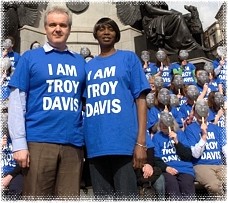 I’m reminded of another T-shirt gesture to protest a man’s innocence. It’s a different type of case, but the underlying logic (of protest) is exactly the same. Amnesty International published a statement about the flawed evidence against a man (Troy Davis) convicted of murder. There was a campaign (‘Too Much Doubt’) to raise awareness of problems with the evidence and the legal process.
I’m reminded of another T-shirt gesture to protest a man’s innocence. It’s a different type of case, but the underlying logic (of protest) is exactly the same. Amnesty International published a statement about the flawed evidence against a man (Troy Davis) convicted of murder. There was a campaign (‘Too Much Doubt’) to raise awareness of problems with the evidence and the legal process.
The Guardian supported the campaign (T-shirts and all). Nobody, to my knowledge, argued that, in so doing, they were supporting the crime (rather than the man and his claims of innocence). The logic of protesting wasn’t drowned out with cries of “shameful” or “beyond the pale” – at least not in the UK’s “liberal” media.
“Zero Tolerance”
“Zero tolerance” on racism has been cited as justification for harsh criticism of Liverpool’s “handling” of the Suarez case. For example, the Guardian’s “Backlash” article stated that:
‘The T-shirts provoked criticism that the gesture conflicted with football’s anti-racism campaign Kick It Out, confusing its zero tolerance message’ (Guardian, 22/12/11)
The “zero tolerance” message has certainly been confused. It’s supposed to be zero tolerance of racism itself, not of the right to dispute somebody’s verdict. “Zero Tolerance” can be a dangerous thing when it’s used to stifle dissent and nullify claims of innocence – it diverges from civilised notions of justice, if one isn’t careful. Instead of being alert to such dangers, media commentators (as usual) seemed in thrall to “official” “authority” (in this case the FA and its “independent” 3-man panel). Unquestioning churnalism resulted.
Whose ignorance?
A cultural/linguistic can of worms is sometimes opened when a word is mistaken for a racial insult. How does one apply “zero tolerance” in these – often ambiguous – circumstances? There are several cases (mainly in USA) of the word “niggardly” being interpreted as a racial slur. In one incident, an aide to the mayor of Washington DC resigned after a complaint that he’d used the word “niggardly” when speaking with two African American employees.
Although this sounds like one of those absurd “political correctness” stories which the Daily Mail likes to make up, it’s true – and it has interesting implications. “Niggard” means ”miser” – it’s unrelated to the racial N-word. But it can be used as a racist code-word. (In March 2010, a billboard appeared in California that referred to President Obama as “niggardly”).
Steven Pinker, the linguist and best-selling author, comments:
‘… it is impossible for anyone to hear “niggardly” without thinking, if only for a moment, of the ethnic slur. […] Worse, the context is of little help in squelching the wrong meaning. […] After the various associates of a word light up in the mental dictionary, the rest of the brain can squelch the unintended ones, thanks to the activity that psycholinguists call “post-lexical-access processing” and that other people call “common sense”.’ (New York Times, 2/2/1999)
The ambiguity of “niggardly” among English speakers is different in kind to that of “negro” among Spanish speakers. But ambiguity is ambiguity, and the same question applies in both cases: if offence is taken mistakenly, does responsibility lie with the speaker or the offended party? In the case of the Mayor’s aide who resigned (he was later reinstated), most US media commentary suggested that the offended person’s ignorance was to blame (ie ignorance of the dictionary meaning of “niggardly”). But the reverse seems to be the case with the Suarez incident, even though Patrice Evra initiated the conversation in Spanish.
Conclusion
I’ll now attempt to answer a question posed in part 1 (“Is national stereotyping necessarily less serious than racial stereotyping?”). When people are perceived as mere units of a group stereotype, dehumanising horrors can result (as history shows) – whether the stereotyping is racial or national/ethnic. So, I can think of no good reason why the Top Gear case should be seen as less serious than racial use of the N-word in a football match. But the point was probably best made (as Steve Coogan suggested) by imagining the Top Gear presenters doing a routine about “lazy Africans” rather than “lazy Mexicans”.
‘If you are arguing for racial equality with a man who
keeps using the word “nigger”, you will eventually discover
that you are making no headway and that some barrier
prevents clear communication’ — Robert Anton Wilson
Media on Racism: Part 1 – Churnalism
 Jan 6, 2012 – 2011 provided some “high-profile” news stories about racism – but even the “quality” press provided little more than churnalism. No doubt it’s safer for reporters to recycle established or “official” views than to delve deeper (or, Editor forbid, to reframe the issue for greater insight). This type of churnalism has its own dangers, as we’ll discover…
Jan 6, 2012 – 2011 provided some “high-profile” news stories about racism – but even the “quality” press provided little more than churnalism. No doubt it’s safer for reporters to recycle established or “official” views than to delve deeper (or, Editor forbid, to reframe the issue for greater insight). This type of churnalism has its own dangers, as we’ll discover…
Two cases, in particular, are worth looking at (and comparing): BBC2’s Top Gear and Luis Suarez (Liverpool FC footballer). Part 1 considers churnalism and misreporting. (Part 2 will address the media framing).
Top Gear & “Lazy Mexicans”
In January 2011, Jeremy Clarkson and his fellow Top Gear presenters did a routine about “Mexicans”. This led to a trickle of news coverage after a complaint from the Mexican ambassador, but it didn’t become a “proper” story until after Steve Coogan wrote a comment piece (for the Observer) which pointed out that Clarkson & co would never target Africans, Pakistanis or Jews with comparable group-stereotype jokes. When I say it became a “proper” story, I don’t mean penetrating, insightful coverage… I mean: “Celebrity A blasts Celebrity B”.
The official officials who officiated in this case were the BBC and Ofcom. First, the BBC:
‘In a letter to Mexico’s ambassador in London, the BBC said it was sorry if it had offended some people, but said jokes based on national stereotyping were part of British national humour.’
Coogan commented: “The BBC’s initial mealy-mouthed apology was pitiful. It cited the more benign rivalry that exists between European nations (ah, those arrogant French, over-organised Germans), and in doing so neatly sidestepped one hugely important fact – ethnicity […] The Beeb’s hand-wringing suggested tolerance of casual racism, arguably the most sinister kind.”
The media regulator, Ofcom, then cleared Top Gear of breaching broadcasting regulations:
‘Ofcom said Top Gear “frequently uses national stereotypes as a comedic trope and that there were few, if any, nationalities that had not at some point been the subject of the presenters’ mockery…”.’
Interestingly, the BBC’s Editorial Complaints Unit (ECU) later upheld a complaint about the show:
“Although the remarks were humorously intended […] their tone and cumulative effect seemed to the ECU to give the impression of reinforcing, rather than ridiculing, the stereotype”
All of which raises some important questions, none of which (to my knowledge) were addressed by media coverage – certainly not by the BBC. (I’ll attempt to deal with these questions in terms of framing in part 2 of this article):
- Is national stereotyping necessarily less serious than racial stereotyping, and if so, why?
- Is national stereotyping okay as long as you abuse all nationalities uniformly and humorously?
- Does the same logic apply to racial stereotyping, and if not, why not?
- Should TV celebrities be punished as severely as, say, footballers?
Trial by media – Luis Suarez
(Note: references to “para” are to relevant numbered paragraphs in the FA report)
This incident started during a football match, after Patrice Evra (Manchester Utd) made the offensive remark, “your sister’s pussy”*, to Luis Suarez. It’s alleged (by Evra) that Suarez used racial insults in the dialogue that followed. (*Evra made the remark in Spanish: “Concha de tu hermana” – para 87).
The official officials who officiated in this case were the Football Association (FA) and their “independent commission” (ie three blokes selected by the FA).
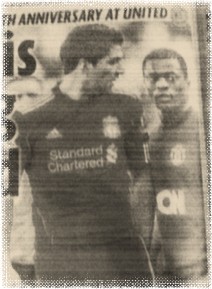 Suarez denies making racial insults. The case boils down to meanings of “negro” in Spanish (nearest equivalent in English is “black”). Suarez claims he said “negro” once, inoffensively. Language experts consulted by the FA agreed that: “the use of ‘negro’ as described here by Mr Suarez would not be offensive. Indeed, it is possible that the term was intended as an attempt at conciliation and/or to establish rapport”. (Para 190)
Suarez denies making racial insults. The case boils down to meanings of “negro” in Spanish (nearest equivalent in English is “black”). Suarez claims he said “negro” once, inoffensively. Language experts consulted by the FA agreed that: “the use of ‘negro’ as described here by Mr Suarez would not be offensive. Indeed, it is possible that the term was intended as an attempt at conciliation and/or to establish rapport”. (Para 190)
Suarez claims he said “Por qué, negro?” (“why, black?” – para 205). Evra claims he said “Porque tu eres negro” (“Because you are black” – para 205). The latter could be taken as offensive according to the FA’s language experts, but the phrase struck them as “slightly unusual” (para 182), whereas the phrase claimed by Suarez “sounded right linguistically and culturally”. (Para 191)
Initially Evra claimed (in English) that Suarez said, at one point: “I don’t talk to you because you niggers” (para 131). He later withdrew this claim, after realising Suarez had said, in Spanish, “negro”, not “nigger”. (The report quotes Evra admitting that he is “not exactly fluent in Spanish” – para 87). As the FA’s experts pointed out, “the Spanish word ‘negro’ cannot simply be translated as ‘nigger’.” (They also point out that “It may be used affectionately … it may be used as a nickname in everyday speech … several famous people in Uruguay are known as ‘el negro’…” (para 172)
These important details (and much else of relevance) somehow went unreported in most media coverage following the FA’s publication of a 115-page report listing the reasons why the 3-man panel found Suarez “guilty” (but not of being “racist” – paras 224, 414, 454). Unfortunately, ‘churnalism’ had taken the place of responsible reporting…
“Racial abuse” churnalism
The report was published by the FA on New Year’s Eve – which probably didn’t help. What journalist wants to spend the last hours of the year reading 115 pages on racial abuse allegations?
The Guardian led the way with lazy, irresponsible churnalism. Three Guardian articles (each by Stuart James, plus another from Andy Hunter) stated as fact that the panel ‘found that Suárez used the word “negro” or “negros” seven times’.
But no such thing was “found” (even though the panel used that word). There was no evidence or corroborating witness statements confirming the number of times Suarez said “negro”. There was nothing but Patrice Evra’s word. (And Evra had altered his account – he initially told Canal+ TV that Suarez used the racial term “at least ten times” (para 154), but later claimed that this was just “a figure of speech” – para 159 – with the FA report stating that he later claimed Suarez used the word “negro” five times – para 205).
In fact, what the report clearly shows is that there was no evidence or supporting witnesses to back up either player’s version of the crucial dialogue between them on the pitch. The entire case came down to one man’s word against another’s. This explains why the panel spent so much time trying to establish a case (again subjective and uncorroborated) that Suarez’s testimony was “unreliable”.
Headline churnalism: “unreliable” evidence
Following the publication of the report, the Press Association ran with: “FA: Suarez evidence ‘unreliable’,” and virtually all major UK media followed suit with similar headings. In what way was the evidence unreliable? The report cites two things – firstly, a few inconsistencies in Suarez’s accounts of the sequence/timing of events (although the panel concedes this is understandable given that Suarez, unlike Evra, wasn’t permitted to see the video footage while being interviewed, and thus relied on memory more – para 320).
Secondly, the panel said it was “unsustainable and simply incredible” for Suarez to describe his behaviour as “conciliatory and friendly” given that “the players were engaged in an acrimonious argument”. (Para 453)
If journalists hadn’t been so quick to ‘churnalise’ the report’s key “findings”, they might have noticed the problems with this – its circular, subjective nature. The panel apparently took as given the very premise under dispute (ie the “acrimonious” nature of Suarez’s “behaviour” – which remains uncorroborated by witness statements and video footage. The panel’s interpretations of Suarez’s expressions and gestures – eg the pat on the head [para 243] – remain deeply subjective and contested).
As a result of this churnalism, every major newspaper report covering this “unreliable evidence” story failed to mention one of the most important pieces of “unreliable evidence” – namely Patrice Evra’s withdrawn initial claim that he was repeatedly called “nigger” (he later conceded it was “negro”), and his withdrawn claim that Suarez said the racial ‘N-word’ “at least ten times” (paras 154, 159). These inconsistencies are at the heart of the allegations, unlike the arguably more minor inconsistencies in Suarez’s account.
Inconsistencies in the “official” report
Another thing that journalists might have highlighted (if they hadn’t been in such a hurry to copy-n-paste summary “findings”) was glaring inconsistency in the report itself.
One striking example is the panel’s “rejection” of the claim that Evra was angry throughout the match – that he was “tipped over the edge” by events (para 333), putting him in an agitated/vengeful state of mind. Here’s what the report said:
‘We rejected that submission […] Mr [Ryan] Giggs described the Liverpool v Manchester United game as the biggest match. He did not consider that Mr Evra was wound up save in so far as everyone was wound up to a certain extent given the fixture. We reject the submission that Mr Evra was unduly wound up such that he was tipped over the edge to pursue vengeance against Mr Suarez.’ [Para 333]
But this conclusion that Evra wasn’t “tipped over the edge” (prior to accusing Suarez) is inconsistent with the testimony of Giggs cited earlier in the report:
‘It was obvious to Mr Giggs from looking at Mr Evra that he was upset. He said that Mr Evra did not seem quite with it, you might call it red mist […] Mr Giggs then told Mr Evra to calm down and not get himself sent off’. (Para 114 – my emphasis)
The report also states that Evra was “angry” from the very start of the match, “when he was seen to dispute the outcome of the coin toss with the referee” (para 329). (Evra, by his own admission (para 92), threatened to “punch” Suarez during the game). Of course, none of this negates Evra’s own testimony – but it provides a clearly relevant example of the panel’s inconsistent treatment of the evidence.
To my knowledge, not a single newspaper commented on inconsistencies of this type, which are evident throughout the report. The reporters had their easy-to-churn, momentum-propelled story: the “unreliability” was all Suarez’s. He was not only a racist, but a liar (although they wouldn’t word it quite so bluntly as that). Case closed. How could it possibly be otherwise?
“No Excuse”
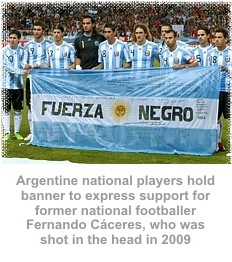 An apparently widely-held view arising from the Suarez case (including, it seems, among Guardian writers and editors) is that since Suarez admitted using the Spanish term “negro” (once), he is guilty of racial abuse, that all mitigating circumstances boil down to “excuses”, and that those who defend him are effectively harming efforts to eradicate racism.
An apparently widely-held view arising from the Suarez case (including, it seems, among Guardian writers and editors) is that since Suarez admitted using the Spanish term “negro” (once), he is guilty of racial abuse, that all mitigating circumstances boil down to “excuses”, and that those who defend him are effectively harming efforts to eradicate racism.
This view has far-reaching implications, of course. Even convicted murderers are granted the right to protest their innocence, citing lack of evidence, mitigating factors (such as self-defence, etc). Their defenders are not usually accused of misguidedly supporting murder – at least not by the “liberal” media.
So what explains these “deep” differences in conceptual approach? Was Patrice Evra correct when he claimed that the Spanish for “your sister’s pussy” translates to “fucking hell” in English? (para 87). And are there any meaningful comparisons to be made between the Top Gear and Suarez cases in terms of media treatment? All this will be addressed in Part 2, which concentrates on the media framing aspects…
Click here for Part 2 of this article >
[Update 11/1/12 – Football lawyer, Daniel Geey, has looked in detail
at some of the evidential inconsistencies which I mention above].
“Officials say…” – The Guardian’s idea of journalism
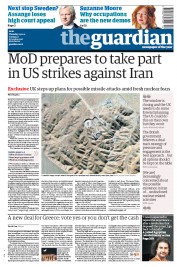 Nov 3, 2011 – Today’s Guardian leads with a story concocted from anonymous “officials” – unnamed “sources”. The Guardian “has been told” stuff – by people who won’t take responsibility for telling it. What have these anonymous “official” people been saying? That Iran is taking a “belligerent posture” and… well, you probably know what comes next:-
Nov 3, 2011 – Today’s Guardian leads with a story concocted from anonymous “officials” – unnamed “sources”. The Guardian “has been told” stuff – by people who won’t take responsibility for telling it. What have these anonymous “official” people been saying? That Iran is taking a “belligerent posture” and… well, you probably know what comes next:-
‘The Guardian has been told that [military] planners expect any campaign to be predominantly waged from the air, with some naval involvement, using missiles such as the Tomahawks, which have a range of 800 miles (1,287 km). There are no plans for a ground invasion, but “a small number of special forces” may be needed on the ground, too.’ (Guardian, 3/11/11*)
Again, let’s be clear about who is saying what. To quote the Guardian article:
“[Unnamed] British officials say that if Washington presses ahead it will seek, and receive, UK military help…”
“The Guardian has spoken to a number of [unnamed] Whitehall and defence officials over recent weeks…”
“The Guardian has been told [by unnamed entities] that…”
“One [unnamed] senior Whitehall official said…”
“In addition to that, [unnamed] officials now believe…”
“[Unnamed] Ministers have also been told [by unnamed entities] that…”
“The [unnamed] senior Whitehall source said…”
“… [unnamed] diplomats believe…”
“Another [unnamed] Whitehall official, with knowledge of Britain’s military planning, said…”
“Another [unnamed] source added…”
“An [unnamed] MoD spokesman said…” (At least they’ve narrowed this down to the MoD.)
“One [unnamed] official said…”
“Western intelligence agencies say…” (Western? Can they not narrow it down to, say, a country?)
“A source said…” (You guessed it – an unnamed source)
“[Unnamed] Experts believe…”
“[Unnamed] British officials admit to being perplexed by what they regard as Iran’s new aggressiveness…”
(All of these attributions to unnamed sources come from the one Guardian article, written by Nick Hopkins).
War framing
What do all these unnamed sources have in common? From what they are reported as saying, it seems they all believe in – or wish to promote – the Fairy Tale of the Just War. In this frame, there’s a villain and a hero – the villain is evil, and the hero is “left with no choice” but to engage the villain in battle, and thus restore the “moral balance”. The “moral balance” in this scenario is that the heroic “West” remains armed with planet-destroying nukes, etc, while the villains are “disarmed”. Order and harmony are thereby restored.
The villains must be disarmed, as otherwise they could victimise the hero and the people the hero defends. The hero makes sacrifices, undergoes difficulties, has “tough decisions”, etc. And, of course, the hero acts honourably by going out of his way to avoid harming innocent bystanders (well, apart from several hundred thousand civilian deaths), whereas the treacherous, immoral villain doesn’t care who gets hurt.
That’s just the basic outline. The frame has further implications and consequences. For example, heroes don’t negotiate with evil villains – they defeat them, etc. (George Lakoff has provided a more in-depth look at metaphorical framing of war – PDF file).
* Note – the Guardian piece first appeared online on the afternoon of the day (2/11/11) before it was printed on the front page (3/11/11). There are a few minor differences in wording between online and printed versions. I’ve quoted from the online version.
“Bad businesses” – reframing wealth-creation?
 Sept 27, 2011 – Three of today’s newspapers (Telegraph, Guardian, Mirror) lead with Labour’s attack on “bad businesses”. If the previews of Ed Miliband’s speech are accurate, Labour is attempting to reframe “wealth-creation”. Miliband will say the Tories “talk as if the CEOs and the executives are the only people who create wealth.”
Sept 27, 2011 – Three of today’s newspapers (Telegraph, Guardian, Mirror) lead with Labour’s attack on “bad businesses”. If the previews of Ed Miliband’s speech are accurate, Labour is attempting to reframe “wealth-creation”. Miliband will say the Tories “talk as if the CEOs and the executives are the only people who create wealth.”
The true wealth-creators, according to Miliband, are “every man and woman who goes out to work”. In other words: JOBS RULE. Work is of primary importance in Labour’s moral-value system. (Back in 2001, the Labour government launched a Work First campaign. JOBS before everything else).
In the framing wars this is no threat to the ideological “free-market” right, where “businesses create jobs”. Even bad businesses. Miliband gets around this by citing “asset strippers” as the main example of “bad business”. (Asset stripping tends to lead to job losses). But this would imply that Labour’s measure of the “good” or “bad” of businesses is how many jobs they “create” or “destroy”.
Does the financial services sector come out as “good” or “bad” in this moral framing? Banks, credit card, loan, insurance companies, etc? They “create” vast numbers of jobs. Mostly low-paid soul-crippling work – eg in call centres; telemarketing nuisance calls, junk-mail production, stuff like that. The “services” they provide can perhaps best be summed up as shuffling lots of ones and zeros around in databases – from relatively poor to relatively rich account holders.
Given the widespread public anger over the bailout of banks (with taxpayers’ money), it would seem a good time to raise big questions about the type of “wealth” “created” by the banking and “financial services” sector.
But instead we get a kind of backwards reframing of “wealth-creation” from Labour. The “moral virtue of jobs” was a framing victory for the early industrialists/capitalists. E.P. Thompson’s classic, The Making of the English Working Class, (1963) described the process. Molly Scott Cato provided an excellent update (with regard to New Labour) here.
Alternative headlines:
• ‘BANKS BAILED OUT BY SLAVE LABOUR’
• ‘GOOD BUSINESSES WORK SHORTER HOURS’
• ‘FINANCIAL SERVICES CREATE NOTHING USEFUL’
“Feral underclass”
 Sept 6, 2011 – On this morning’s front pages we have a choice between the Guardian on rioting “criminal classes,” and Daily Express “fury” over some judge’s remark that squatters “are not criminals.” The Guardian reports Kenneth Clarke’s comments about a “broken penal system” and “a feral underclass, cut off from the mainstream in everything but its materialism”.
Sept 6, 2011 – On this morning’s front pages we have a choice between the Guardian on rioting “criminal classes,” and Daily Express “fury” over some judge’s remark that squatters “are not criminals.” The Guardian reports Kenneth Clarke’s comments about a “broken penal system” and “a feral underclass, cut off from the mainstream in everything but its materialism”.
The Express reports a Tory MP saying “I am outraged” (over the judge/squatters).
In newsagents, you can sometimes observe people tutting and/or nodding in response to such “news”. It’s probably advisable to give a wide berth to people who exhibit such reactions.
“What is happening to our young people? They disrespect their elders, they disobey their parents. They ignore the law. They riot in the streets inflamed with wild notions. Their morals are decaying. What is to become of them?” — Plato, 4th Century BC
Alternative headlines:
• ‘SAME AS 10YRS AGO, SAME AS 100YRS AGO’
• ‘READ A GOOD BOOK INSTEAD’
• ‘MOVE ALONG – NOTHING TO SEE HERE’



